When Isaac Powell was a high school senior boarding at the University of North Carolina’s School of the Arts, the actor’s dorm window was the only one in his building that hinged outwards; it became a portal for his bad behaviour. “I smoked so much pot,” he says now, laughing in a London café. “I started sneaking out and going to college parties, and sneaking my girlfriends from their dorm into the boys.’” He had yearned for that freedom since he was a child growing up in the American-identikit city of Greensboro, a 30-minute drive away. “I’ve always really struggled with authority and with supervision,” he says. He enjoyed having the guard rails lifted.
Powell, now 29, has cleaned up his act a little since then – more cheeky than angsty, he makes a joke when I suggest that he’s been “shooting loads”, as in working on lots of film and television – but that lawlessness has made him a better actor, one who finds himself toying with risk all the time.
Despite over half a decade of industry grafting, his star recognised in theatre circles, it feels like this year is the moment Powell has found his place in Hollywood. It’s ironic then that his latest role sees him play a mere assistant. In the new comedy series The Franchise, the Sam Mendes-directed, Armando Ianucci and Jon Brown-penned show which just wrapped on HBO, Powell plays Bryson, the second-in-command to a spiritually omnipresent but never-seen studio head, who constantly has to chime in when shit starts to hit the fan. (For one example of the satirical levels involved in an Ianucci project, the audition had Powell pretending to be Bryson impersonating his boss on an important phone call). When he first read the script he said he could “hear the music of the writing” but found the shooting experience – his first time on a comedy set – “really weird” because “nobody can laugh: [you have] to be quiet or the take gets ruined”. He was grateful then when, at the show’s Los Angeles premiere, the crowd were in fits of laughter at the disasters unfolding. Thankfully, the experience of faking a terrible superhero movie set hasn’t put him off the idea of making one himself one day; “something really action packed, but kind of irreverent” is his preference, “like Deadpool or The Boys.”
It was back in 2019 when the provocative Dutch stage director Ivo van Hove gave Powell his first “really big break”: playing Tony in his spiky and controversial take on West Side Story on Broadway in late 2019. “He had a way of unlocking these parts of me that before had been kind of stilted and mysterious,” Powell recalls. Later, in 2021 and 2022, Ryan Murphy enlisted him to join the cast of his American Horror Story franchises, playing a voodoo doll for aliens in Double Feature and a Mapplethorpe-esque photographer in NYC.
“Looking at the industry that I’m working in, it’s nothing but risk”
All three – van Hove, Murphy, Mendes – “are incredibly exacting artists,” Powell says. “There’s a level of expectation there, [and they] require you to meet them on that level.” Another artist he’s added to that roster is musician Florence Welch. In June, after pivoting to screen work post-pandemic, he returned to the stage to play the titular character in Gatsby: An American Myth, a new musical adaptation of the F. Scott Fitzgerald book at the American Repertory Theater in Cambridge, Massachusetts. Welch wrote the music, and “expanded the inner worlds of these characters.”
There’s whispers of where Gatsby might go next, but for the moment, Powell is getting his recentering moment. After working on Gatsby, then The Franchise, then Gatsby once again, he spent the latter half of the summer travelling Europe with friends, swimming and hiking and playing card games. Soon, he’d like to lead a movie. “I’ve yet to do that, and I feel like I’m very ready to,” he says.
There was a time, while still in drama school, when Powell didn’t think acting would work out. He assumed he’d become a casting director. “I’m very pragmatic, and I tend to be a bit risk averse,” he says, “which is kind of wild to say, because now I’m looking at the industry that I’m working in, and it’s nothing but risk. But risk is important. It’s necessary.”
Credits
Writer: Douglas Greenwood
Photography: Jackson Bowley
